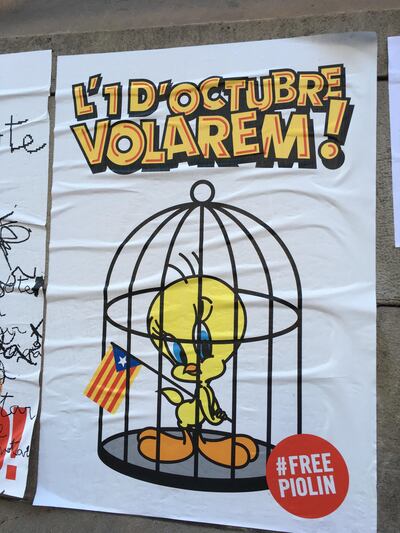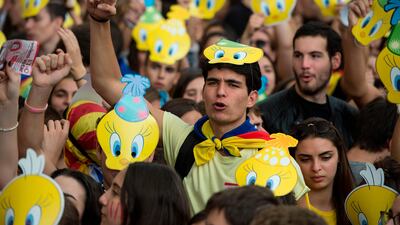As Catalans prepare to go to the polls on Sunday to vote for or against independence from Spain, an unlikely symbol of resistance has emerged on the streets of Barcelona: Tweety Pie.
Over the past week, images of the good-natured yellow canary of Looney Tunes cartoon fame have been appearing on walls around the city, as well as on placards carried at pro-independence rallies and on T-shirts worn by secessionists. One poster plastered on buildings shows Tweety encaged — presumably by Madrid — but defiantly holding aloft the Catalan flag, known as the Senyera.

Tweety's arrival in Barcelona coincided with the deployment last week of 5,000 police to the Catalonia capital amid growing tensions between Catalan secessionists and the Spanish government, which says Sunday's referendum is illegal because it violates the constitution. In recent days, Spanish police have arrested Catalan officials, confiscated about 10 million ballot papers and sealed off more than 2,300 schools that were set to be used as polling stations.
Owing to an accommodation shortage in Barcelona, the Spanish interior ministry housed the extra officers in two large ferries hired from the Italian company Moby Lines and anchored in the city's port. That was unusual enough, but it was what was painted on the side of one of the ferries, the Moby Dada, that really caught everyone's attention. They were animals from Looney Tunes cartoons, including Wile Coyote, Tweety Pie's archenemy, Sylvester the cat, and, of course, the canary himself.
They also caught the attention of Warner Bros, the entertainment company that produces Looney Tunes. According to Spain's El Mundo newspaper, Warner Bros complained to Moby Lines, saying the characters were being used without its permission.
Soon after, Tweety and friends were covered up. But some secessionists perceived this as a symbol of Madrid’s opposition to the independence vote and alleged censorship of Catalan ideals. Student protesters were the first to claim Tweety as a pro-Catalonia symbol and #FreePiolin (#FreeTweety) was soon trending on Twitter.
“We use Tweety because the Spanish government sent the Spanish police here to Barcelona in a ship with a picture of Tweety Bird … The police are here to take our ballots when we only want to vote,” said Maria Garcia, 20, a student at the Universitat Ramon Llull Caldes de Montbui. With a dozen other volunteers she was handing out ballot papers.
The Moby Dada can accommodate about 1,600 passengers — in this case police who will be posted at polling stations across the region on Sunday to stop Catalans from voting in the referendum. In some schools that are to be used as polling stations, referendum supporters have set up camp to ensure the buildings stay open when voting begins at 9am. But police are under orders to clear everyone out well before that — by 6am.
Many secessionists say Madrid is being undemocratic in opposing the vote, which courts have declared illegal as Spain's constitution makes it clear that only the national parliament can change the constitution.
_______________
Read more:
Catalonia pledges to hold referendum in defiance of Rajoy
Real Madrid's Sergio Ramos criticises Barcelona's Gerard Pique for pro-referendum comments
Spanish court imposes 12,000 euro daily fine on Catalonian officials
_______________
But Carles Puigdemont, the president of the semi-autonomous Catalan region, claims his people have the right to vote on its future. On the eve of the referendum, he said Catalonia and Spain should enter into discussions regardless of the outcome of the vote.
Earlier this month, Mr Puigdemont sent a letter to Spanish prime minister Mariano Rajoy, requesting "open dialogue without conditions". But with both sides entrenched in their positions, negotiations are unlikely to take place at this stage.
"Without compromise on either side, there is certainly a risk that the crisis could escalate,” said Dr David Brydan, a lecturer in modern European history at Birkbeck College, University of London.
The Swedish financial services group Nordea Bank has also warned that “considering how determined the Catalan government has been on the matter, a further escalation cannot be ruled out."
But despite the risk of escalation and although opinion polls show that Catalonia is split on the question of independence, many Catalans, including Ms Garcia, would like to end the dispute through democratic means.
On September 20, FC Barcelona released a statement in which it reiterated “its historic commitment to the defence of the nation, to democracy, to freedom of speech, and to self-determination” and said it “condemns any act that may impede the free exercise of these rights".
Meanwhile, Gerard Pique, the football club's home-grown defender, tweeted on Thursday: “From today and until Sunday, let us express ourselves peacefully. Let’s not give them an excuse. That's what they want. Let’s sing loud and strong. #Wewillvote.”
Barcelona play Osasuna at home on Sunday and Catalans are certain to use the occasion to celebrate Catalan identity and show their opposition to Spanish prime minister Mariano Rajoy’s government. For many Catalans, victory at the Nou Camp stadium will be secondary to the result of the referendum.
“If we win, we want to be a new country of Europe,” said Ms Garcia. Tweety — that unlikely mascot of defiance — beamed down from the wall behind her.

